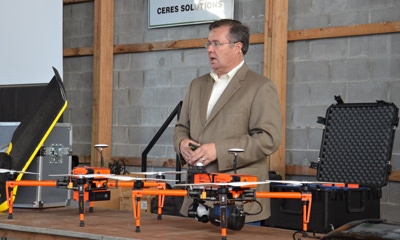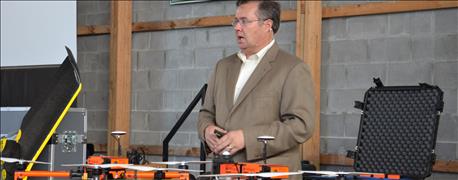
If you raise corn and want to know about various nitrogen application methods, you seek out a dealer or applicator who applies on lots of acres each year. If you want to know the ins and outs of ever-evolving UAV technology, you seek out someone who has flown various models for a long time.
One person who fits the bill is Chad Colby. He is general manager of Central Illinois Ag, a Case IH dealer in Atlanta, Ill. But he’s also one of the Midwest’s foremost authorities on buying, operating and maintaining drones, and doing it all legally.

QUESTIONS ANSWERED: Whether you already have a UAV or just wish you did, here are answers to frequently asked questions about drones, from UAV expert Chad Colby.
Recently, Colby stood before an audience of farmers and FFA members and turned them loose to ask him questions about UAV use. Here are key questions and answers.
Question: Can you buy insurance if you fly a UAV?
Colby: Yes, I carry a $2 million liability policy. At first it was fairly expensive, but the price is coming down today. You definitely want to carry liability insurance for this activity. Several more companies are offering it today than were in the business just a couple of years ago. Vermillion, Parke, Fountain and Warren County Farm Bureau young farmer groups sponsored this information meeting. The sponsors note that in Indiana, Farm Bureau Insurance offers this type of coverage.
Question: Is a UAV useful in finding a broken tile line?
Colby: Yes. If you farm 2,500 acres, it’s tough to cover that many acres on the ground looking for tile problems. With one of these devices, you can do it quickly. Drone Deploy is a subscription service that handles information collected from UAV flights and produces images. This particular product has capabilities which make it easy to search for tile lines and tile line issues.
Question: Does it make sense to buy an inexpensive drone and learn how to fly it before investing in a good one?
Colby: Absolutely. You can get a rotor-type drone now for $50 to $100 which might even have a basic camera on it. If you haven’t operated controls before and you are going to fly manually, it offers a great chance to learn. If you crash it or fly it into a tree, you haven’t lost that much money if you can’t repair or retrieve it.
Question: Fixed-wing UAVs usually cost considerably more. Why would I want to buy one?
Colby: It’s all about the mission! If you need to fly and scout lots of acres quickly, a fixed-wing UAV will likely give more capacity to do so. They typically have longer flight times, and can withstand stronger wind speeds while flying. A major part of the extra expense is in the flight controller. If you’re scouting 60 or 80 acres at a time, then a rotary ship with a 20-minute flight time that carries a much lower price tag may be your best choice.
About the Author(s)
You May Also Like




